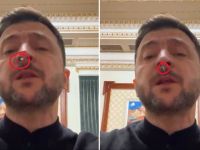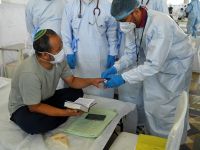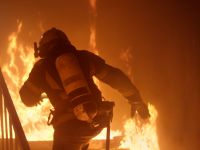Israeli tanks moved into the West Bank city of Jenin on Tuesday night, drawing fire from Palestinian fighters, after a Palestinian suicide bomber killed 19 Israelis in Jerusalem, witnesses said.
Israel's security cabinet ended a meeting called to consider what was likely to be a harsh military response to the morning bombing.
Palestinians in Jenin said at least five army tanks and an armored bulldozer rolled into the city after nightfall. The witnesses said Palestinian fighters fired at the tanks from inside Jenin's refugee quarter but the Israelis had not shot back. Two Israeli helicopters as well as F-16 fighter jets were seen over the city, the witnesses added.
They said more army vehicles were approaching Jenin. It was not immediately clear if this incursion was part of an Israeli response to the bombing. Israeli forces move into Palestinian towns and villages almost every day.
Earlier it was reported that Israel decided to retaliate for the bombing attack. Prime Minister Ariel Sharon and Defense Minister Binyamin Ben Eliezer made the decision to respond, Israel Radio added.
Israeli government sources cited by the radio said Sharon and Ben Eliezer met with army and security officials to discuss the riposte to the latest attack.
According to Haaretz, government sources said that following Sharon and Ben Eliezer consultations there was no change in the decision, at present, not to expel Yasser Arafat.
The fact that the security cabinet was not convened, the sources pointed out, was a signal that Israel's response would be in line with responses to recent attacks.
Israel Radio reported that Foreign Minister Shimon Peres was on his way back to Israel after cutting short a diplomatic trip to Bulgaria and Slovenia.
Meanwhile, Israeli commandos killed an activist of the Islamic Jihad in a "targeted" hit in the West Bank city of Hebron on Tuesday, Israeli and Palestinian sources said.
Yussef Bisharat, 22, was gunned down in his car at an army roadblock at the northern entrance to Hebron, said an Islamic Jihad spokesman, who added that Bisharat was a member of his group's military wing. Two other people in the car were arrested.
Bisharat's brother Mohammed, a Jihad military leader for the northern West Bank, was also assassinated a year ago near the town of Jenin by Israeli helicopter gunships, in an attack in which two others likewise died.
Israeli security sources said Bisharat was on a wanted list for having opened fire on March 26 at a jeep of an international force in Hebron killing two observers.
Bush
Meanwhile, U.S. President Bush may send Secretary of State Colin Powell to the Middle East to try to promote peace efforts, AP reported.
A senior U.S. official said a Powell mission could be undertaken as early as next week, but that Bush had not made a decision yet. The idea was under consideration even before the latest bus attack, said the official.
"The president condemns this act of terror in the strongest possible terms," White House spokesman Scott McClellan said.
McClellan insisted that the Jerusalem bombing does not affect Bush's plans. "It's important for us to continue to move forward on the endgame," McClellan said.
Administration officials had said Monday night Bush would announce a proposal for Palestinian statehood Tuesday or Wednesday that would require democratic reform in the Palestinian Authority.
White House officials said the address was pushed back until at least Thursday while Bush sorts through his options and advisers consider the implications of Tuesday's attack.
A senior White House official said U.S. diplomats are consulting with world leaders.
State Department spokesman Richard Boucher said "the violence makes it more difficult to proceed down this path" to peacemaking. Specifically, he said it has "changed political perceptions in Israel."
However, Boucher said "we continue to look for ways to move forward" in the Middle East.
He declined to say whether Powell would go to the region. "I have nothing for you on that," the spokesman said.
Hizbullah
Hizbullah chief Sheikh Hassan Nasrallah said on Tuesday the suicide bombing in Jerusalem proved Israel had no chance of stopping suicide attacks with a security fence on its West Bank frontier. Nasrallah said Israel had failed to crush the 20-month-old Palestinian uprising.
"The concrete fence is a physical Israeli admission, in addition to the verbal admissions, of the failure of the Zionist policy and measures to hit and dismantle the resistance," Nasrallah told a gathering of Arab and Muslim parliamentarians.
"The Israelis admit today...they were unable to dismantle the resistance infrastructure or crush the will of Palestinians to resist and this is shown by the (suicide) operations that took place after the end of the 'Defensive Wall'," he said, referring to an Israeli operation in the West Bank to round up suspected activists.
"These checkpoints and delays and walls might partly delay the operations for a period of time but, on the other hand, they will force the Palestinian fighters and resistance to focus most or all of their efforts on the...settlements," he said.
Nasrallah said Israeli Prime Minister Ariel Sharon had already rejected a Palestinian state, and, mocking the language of U.S. diplomacy, said an ideal solution would be for Israelis to leave Israel, as well as the West Bank and Gaza Strip.
"I suggest that the solution should be for one state, a Palestinian state from the Mediterranean Sea to the Jordan river," Nasrallah said, "because the land of Palestine, as Sharon has admitted, cannot hold two states". "We request that they (Israelis) go back where they came from. I believe the Arab states can pay for them to go back, first class." (Albawaba.com)
© 2002 Al Bawaba (www.albawaba.com)







